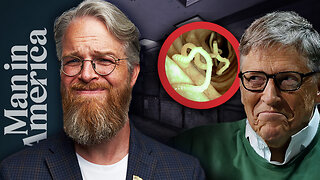Premium Only Content

Episode 1795: Don't lose Confidence and have a Child Like Faith
Did you ever sit with a child before they hit the age of reason, and they are really very much at peace? They are simple. You would say “yah because they have nothing to be worried about because their parents manage all the tough stuff. Well true but we are missing the bigger point.
Do you remember when Christ said in Matthew 18:3
" Amen I say to you, unless you be converted, and become as little children, you shall not enter into the kingdom of heaven."
Well why would he say this? Doesn’t that sound irresponsible? But if you stop and think about it Christ was 100% Human and 100% God and so even his Human side was perfect. If he thought that and said that then why do we not believe or live that way?
Jesus is emphasizing the need for humility and childlike trust in our approach to God. The passage points us as believers to be like little children in our faith, acknowledging their dependence on God with simplicity and trust.
In the context of Catholic theology, this verse is often interpreted as a call to spiritual conversion and a reminder that true greatness in the kingdom of heaven is found in childlike qualities such as humility, trust, and openness to God's guidance. It underscores the importance of turning away from pride and worldly concerns to embrace a childlike faith that is characterized by trust in God's love and guidance.
Instead, we wake up and get busy figuring out our day and in many cases we may be plagued with outside interference with our peace of mind. Why? Because to a certain extent we have been trained to worry. What do I have to get done today, what is the latest issue I must resolve? If I can just get through these issues then I will be okay, but I must be responsible and deal with all these issues. Really? Why?
You have heard me say first give Christ and the Blessed Mother your very first and best fruits of your day and then with confidence do not worry and go about your day. It may not be perfect, and it does not mean you will not have certain issues that need your attention, but you will have a completely unique perspective. Thy will be done dear Lord not mine. It lifts the everyday concerns right off your shoulders. But many over focus on those issues and truly push Christ out of the picture. I must, I have to, I cannot. Nope! I will and this too shall pass must be your mantra.
Now I will say and probably said many times before, uncomplicate your lives. Do with as much as possible and you will be amazed at how uncluttered your life becomes. Live simple lives so that you have more time to truly focus on Christ.
Do you remember growing up and your parents simply did not push to have. They kept their lives as simple as possible. Why? They realized they were not only not going to keep up with the Jones but in their brilliance they knew instinctively that it would lead them into an uncertain slavery. Bishop Sheen once said, “Be very careful of what you ought to verse what you need.” In other words you ought to have this or that, but do you really need it?
Now why do I lead with all this? Because as we are fast approaching the Lenten season we need to do a spring cleaning of our lives and remove as many ought’s as possible, so we have more time for prayer and Christ. Do not give up chocolate for Lent but rather give up the vast number of ought’s you have in life and focus on Christ. It is very simple and so simply that we tend to over complicate our lives. I tell you truthfully I have scaled back in my life style. So much so that I put the F in Frugal in order to put the P in Prayer. I must remove as much as possible that keeps me distracted. Lets do this together as we enter Lent. Do not worry Pray.
Matthew 14:29-31 there is an account of Peter walking on water towards Jesus:
'Come,' he said. Then Peter got down out of the boat, walked on the water and came toward Jesus. But when he saw the wind, he was afraid and, beginning to sink, cried out, 'Lord, save me!' Immediately Jesus reached out his hand and caught him. 'You of little faith,' he said, 'why did you doubt?'"
The traditional Catholic view on not worrying and focusing on Christ aligns with broader Catholic teachings on faith, trust, and reliance on God's providence. The passage mentioned earlier about Peter walking on water (Matthew 14:29-31) is often interpreted in Catholic theology to emphasize the importance of faith and trust in Christ amid life's challenges.
Catholic teachings encourage believers to place their worries and concerns in God's hands through prayer and trust in divine providence. The Catechism of the Catholic Church addresses the virtue of hope, which includes trust in God's mercy and the confident expectation of eternal life (CCC 1817-1821).
So you have heard me say many times, when concerned or in doubt turn away from our secular world and secular loves because it will draw us to man. Instead turn to your Church Teaching as your GPS guide. So what does our Church teach? Well lets look at the 3 C’s.
The Catechism of the Catholic Church (CCC) which is a comprehensive and authoritative summary of Catholic doctrine. In the context of the virtue of hope and the idea of not worrying but placing trust in Christ, you can find relevant passages in CCC 1817-1821. Here is a brief overview:
CCC 1817 - Hope as Virtue:
"Hope is the theological virtue by which we desire the kingdom of heaven and eternal life as our happiness, placing our trust in Christ's promises and relying not on our own strength, but on the help of the grace of the Holy Spirit."
This passage establishes hope as a theological virtue, emphasizing the orientation of the believer towards eternal life and reliance on Christ's promises with the assistance of the Holy Spirit.
CCC 1818 - The Virtue of Hope and the Church:
"The virtue of hope responds to the aspiration to happiness which God has placed in the heart of every man; it takes up the hopes that inspire men's activities and purifies them so as to order them to the Kingdom of heaven; it keeps man from discouragement; it sustains him during times of abandonment; it opens up his heart in expectation of eternal beatitude."
Hope is presented as a response to the innate human desire for happiness, purifying earthly hopes and sustaining individuals in times of difficulty. It also directs the believer's heart towards the expectation of eternal beatitude.
CCC 1819 - Catholic Hope:
"Christian hope takes up and fulfills the hope of the chosen people which has its origin and model in the hope of Abraham, who was blessed abundantly by the promises of God fulfilled in Isaac, and who was purified by the test of the sacrifice."
Christian hope is connected to the hope of the chosen people, tracing its origin to figures like Abraham. It highlights the fulfillment of God's promises in the Christian context.
CCC 1820 - The Theological Virtues:
"The theological virtues are the foundation of Christian moral activity; they animate it and give it its special character. They inform and give life to all the moral virtues. They are infused by God into the souls of the faithful to make them capable of acting as his children and of meriting eternal life."
This passage emphasizes the theological virtues, including hope, as foundational to Christian moral activity, shaping and animating all moral virtues.
CCC 1821 - Hope, a Blessing, and a Grace:
"The gift of hope is the supernatural virtue by which we desire the kingdom of heaven and eternal life as our happiness, placing our trust in Christ's promises and relying not on our own strength, but on the help of the grace of the Holy Spirit."
This reiterates the nature of hope as a supernatural virtue, emphasizing trust in Christ's promises and reliance on the grace of the Holy Spirit.
In summary, these passages from the Catechism of the Catholic Church articulate the theological understanding of hope as a virtue, the role of hope in Christian life, and the reliance on God's promises, particularly in the context of seeking the kingdom of heaven and eternal life. The teachings encourage believers to place their trust in Christ and to cultivate hope as a guiding principle in their journey of faith.
So pray every single day and do not become distracted.
Additionally, Catholic spirituality often emphasizes the practice of mindfulness and contemplation as a means of deepening one's relationship with Christ. Devotional practices, such as Eucharistic adoration, the Rosary, and meditative prayer, are seen as ways to center one's focus on Christ and cultivate a sense of peace and trust.
Saints and spiritual writers within the Catholic tradition have provided insights on surrendering worries to God and trusting in His guidance. For example, Saint Teresa of Ávila and Saint Thérèse of Lisieux have written about the importance of childlike trust in God.
Ultimately, the traditional Catholic perspective encourages believers to cast their anxieties on Christ, recognizing Him as the source of strength and peace in the midst of life's challenges.
But as always I must bring in the good Father and let him wrap it up much better than I. Now go out and convert someone to a Childlike trust in Christ. Good Day.
-
 LIVE
LIVE
Total Horse Channel
13 hours ago2025 Reno Snaffle Bit Futurity | Saturday
10,881 watching -
 LIVE
LIVE
Major League Fishing
2 days agoLIVE Tackle Warehouse Invitationals Championship, Day 2
592 watching -
![Mr & Mrs X - [DS] Trafficking Empire – The Pedo Network Island, The Cover-Up: Part 2 - Ep 6](https://1a-1791.com/video/fww1/f8/s8/1/y/p/x/f/ypxfz.0kob-small-Mr-and-Mrs-X-DS-Trafficking.jpg) 59:56
59:56
X22 Report
17 hours agoMr & Mrs X - [DS] Trafficking Empire – The Pedo Network Island, The Cover-Up: Part 2 - Ep 6
47K15 -
 1:03:07
1:03:07
Candace Show Podcast
1 day agoI’M BACK! And STILL Asking Questions (Sorry Brigitte). | Candace Ep 233
82.1K197 -
 1:12:09
1:12:09
Wendy Bell Radio
6 hours agoPet Talk With The Pet Doc
6.43K34 -
 27:15
27:15
Liberty Hangout
2 days agoThe Most DELUSIONAL Democrats on Earth!
27.8K126 -
 13:13
13:13
Mrgunsngear
17 hours ago $3.37 earnedStreamlight TLR-1 HP Review: Can It Dethrone Surefire?
21.2K9 -
 38:41
38:41
JohnXSantos
23 hours ago $0.56 earnedHow To Start A CLOTHING BRAND on a BUDGET! Step X Step (2025)
6.75K1 -
 1:26:34
1:26:34
Man in America
19 hours agoExposing the Cover-Up That Could Collapse Big Medicine: Parasites
70.7K65 -
 30:57
30:57
Her Patriot Voice
16 hours ago $15.61 earnedDemocrats More Unhinged Than EVER Before!
93.3K127